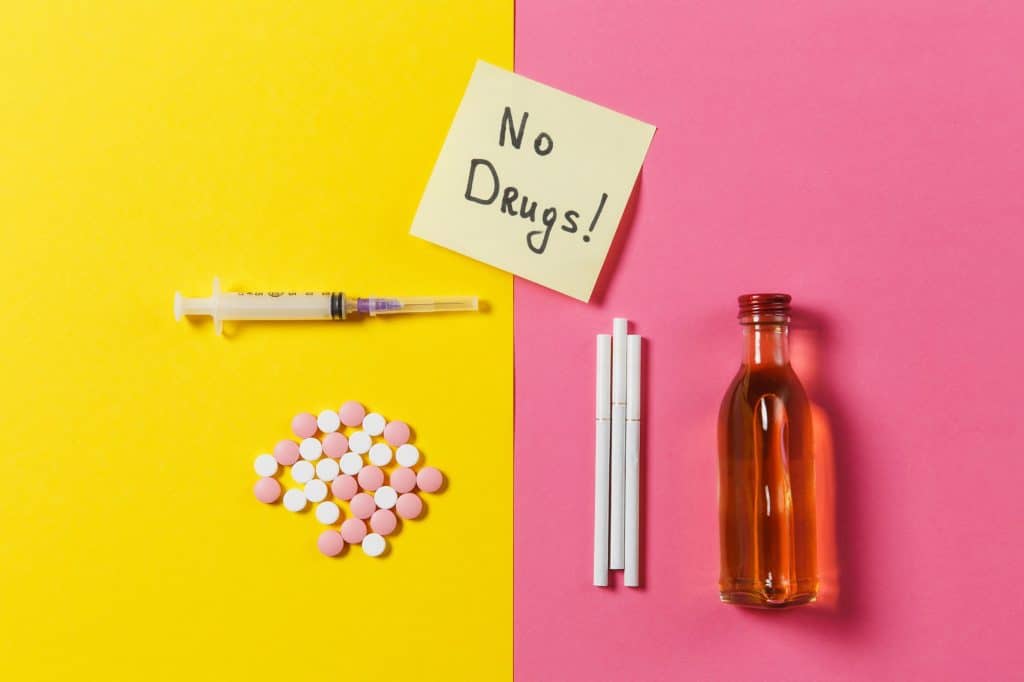Drug abuse and its management

- Drug Abuse
- 14 Aug 2023
Overview
What is drug abuse?
Drug abuse (substance abuse) is using certain substances harmful to the body to get momentary pleasure. It affects the brain, eventually leading to distress in one’s life. It later causes significant problems in a person’s life, like unable to withdraw from the substance and drug tolerance. 1Overview | Researched based study from Nlm.nih.gov

Facts
Some facts about drug abuse
- There are around 190 million drug users around the world .
- Drug abuse is rapidly increasing among the adolescent less than 30 years of age .
- The general effect of any drug abuse is always disastrous .
- Drug abusers using needles are at increased risk of developing viral infections such as hepatitis and HIV(human immunodeficiency virus) . 1Facts | Researched based study from Nlm.nih.gov
- Males may take illegal substances more frequently than women, but if they do, women may develop addictions just as easily as men do.
Symptoms
Symptoms of drug abuse
To confirm that a person suffers from drug abuse, he must show two or more symptoms below within one year.
- Repeated drug use hampers the user from carrying out life activities .
- Repeated drug use despite related problems in one’s life, such as relationship problems, legal problems etc .
- Consuming high doses of the same drug to get the desired effects .
- Increased urge to take the drug .
- Taking a longer time to recover from the drug effect .
- Total stoppage of mixing with society, family and friends because of drug use .
- He continues to consume the drug despite its adverse psychological effects .
- Always buying and keeping the drug with oneself despite its high cost .
- Unable to quit even if one wishes to and have withdrawal symptoms such as restlessness and body shaking 2Symptoms | Researched based study from Nlm.nih.gov .
Causes
Causes of drug abuse
- Inquisitiveness among the adolescent and schoolchildren
- Certain rituals or religious practices
- For leisure purposes or fun
- Prescribed drugs for pain relief taken for leisure intent
- Inspired enthusiasm from friends and others 3Causes| Researched based study from Nida.nih.gov
Examples
Common Abuse Substances
Caffeine
- Present in coffee, tea and soda
- Excess consumption causes tremors, nervousness and sleep difficulty .
Alcohol
- It is harmful to the developing fetus
- It affects the interpersonal behavior of the individual .
Cocaine
- It stimulates the nervous system
- It makes the person restless .
Marijuana (Cannabis)
- Causes infertility problems in individuals
- Causes hormonal imbalance in men
- Decreases sex drive .
Cathinones (chemically similar to cocaine)
- Also called jewelry or phone screen cleaner
- Cause excitement and appetite loss .
Ecstasy
- Creates euphoric(excited) mind
- Overdose makes the body temperature very high, which can be fatal .
Inhalants
- They are usually home cleaners like bleach, ammonia etc
- It can cause brain damage
- It can be fatal .
Hallucinogens
- They can be present in certain mushrooms.
- It creates wrong perceptions in a person’s mind, which can sometimes be fatal. E.g. jumping out of the window thinking he can fly.
Opiates (narcotics)
- They are heroin, morphine, methadone etc
- It extremely reduces the nervous system’s functioning
- It is fatal when taken in high doses
Nicotine
- Nicotine is found in cigarettes
- It is the most addictive substance
- It increases blood pressure and heart rate
- It can lead to heart attack
Sedatives (anti-anxiety drugs)
- It suppresses the nervous system
- Overdose causes respiratory arrest(stoppage of breathing)
Phencyclidine
- It makes the person suspicious
- It makes people highly aggressive with extensive body strength
- Such persons tend to hurt others
Amphetamines
- Usually comes in prescription medicines. E.g. Ritalin ,focalin
- Overdose causes convulsions and death
Anabolic steroids
- Usually consumed by athletes and bodybuilders
- It causes aggressiveness
- Long-term use causes infertility and organ failure 4Examples | Researched based study from Nlm.nih.gov
Vulnerability
People at risk of abusing drugs
- If parents or family members are addicted to drugs, one is more likely to develop drug abuse habits earlier or later.
- If close friends, office colleagues, and other near ones have the habit of substance abuse, then one has more probability of developing the drug abuse habit.
- If children start consuming drugs at an early age, then they have a higher chance of developing drug abuse habits with growing age.
- If one has grown up with family issues and is not close to their parents, has a greater chance of developing substance abuse.
Other risk factors which lead to drug abuse
- Sexual, physical or emotional mistreatment in one’s life .
- Mental issues such as anxiety, depression and other personality disorders .
- Problems in the family, work and other spheres of life .
- Easy availability of the drug abuse substances .
- Any early history of mental trauma in one’s life 3Vulnerability | Researched based study from Nida.nih.gov
Diagnosis
Diagnosis of drug abuse
- A complete assessment is necessary to diagnose drug addiction, and this assessment frequently involves a certified alcohol and drug counsellor along with a psychiatrist, and a psychologist .
- Psychiatrists or psychologists diagnose drug abuse patients by thoroughly collecting information about their medical condition, family history and mental status, followed by a physical and psychological status examination.
- For diagnosis of drug abuse, specific questionnaires [based on the mental disorders manual (DSM-5)] are also asked to the patients to identify their mental status, such as depression, anxiety, hallucination (misperception), personality disorder etc. 7Diagnosis| Researched based study from Nlm.nih.gov
- There is no single test that diagnoses drug abuse. Blood tests and urine tests are also prescribed for assessing drug use and giving treatments.
Management
Management of Drug abuse
Detoxification
- Detoxification /withdrawal therapy helps one escape the drug abuse habit safely and quickly as early as possible. 1Management | Researched based study from Nlm.nih.gov
- The detox process includes gradually reducing the drug dose or providing other drug substitutes such as buprenorphine, methadone or a combination of naloxone and buprenorphine.
- The withdrawal therapy approach differs for different categories of abused drugs viz; opioids, depressants.
Medication for treatment
Methadone
- Relieves severe pain
- Used to treat those with a confirmed opioid disorder
Buprenorphine
- For chronic pain, acute pain and
- To get rid of opioid dependency
Naltrexone
- Use for both alcohol and opioid dependence
Buprenorphine and Naloxone in combination
- To prevent withdrawal symptoms from drugs
- Reduces drug abuse ability
Psychological therapy
It is usually done by a psychiatrist, psychologist or mental counsellor.
They provide counselling sessions which provide help on the following things: 5Management| Researched based study from Nlm.nih.gov
- Help create ways to get rid of the irresistible drug urges .
- Provide approaches to avoid the drug intake .
- Provide solutions if symptoms reappear after trying to quit .
- Talk and provide solutions to different difficulties in life viz; family, friends, job .
- Talk to the other family members to develop good communication as well as support .
- It will also provide necessary help for other mental conditions like anxiety and depression .
Contacting the self-help groups
Self-help groups are certain groups of informal associations which come together to address the drug abuse issue. Self-help groups help, 5Management | Researched based study from Nlm.nih.gov
- Reduce the societal stigma(shame) of the drug abusers
- Reduce their isolation in society
- Decrease the chances of relapse(health deterioration after improvement)
However, such self-help groups can be contacted locally through the mental therapist or the internet for the required help.
Post-treatment care
After completing the initial treatment, one should do the following things to prevent relapse in future.
- Appointments with the health care provider from time to time
- Continuing the self-help group for support
- Attending health therapy sessions regularly2Management | Researched based study from Nlm.nih.gov 5Management| Researched based study from Nlm.nih.gov.
However, contact the emergency health number immediately if a relapse occurs.
Consequences
Consequences of drug abuse
- Severe dehydration
- Liver damage
- Kidney damage
- Heart failure
- Memory loss
- Brain damage
- Psychotic behaviour (unusual mental behaviour)
- Seizures(body shaking)
- Sudden death
Other complications of drug abuse
Being infected
One can get the infectious disease like HIV and hepatitis while
- Sharing needles for drug abuse or
- Having unprotected sex
Family problems
- More arguments, even on little issues
- Continual conflict ruins the family relationships .
Office problems
- The decline in work performance
- Remaining absent from work very often .
Legal problems
- Buying and possessing illegal drugs
- Rash driving after drug consumption
Financial problems
- Spending money on drugs even when there are other needs.
- later occurrence of chronic and costly medical conditions such asthma, diabetes, hypertension, heart disease, chronic pain, arthritis, and chronic pain .
Suicide
- Severe depressions due to drug abuse lead to suicides in some cases 1Harms | Researched based study from Nlm.nih.gov .
Prevention
Prevention of drug abuse
- Avoiding taking the drugs in the first place, although not much feasible
- Taking help from mental counseling centres
- Reducing the feeling of what others might think in society
- Parents concerned with children’s drug abuse should talk with their kids in a friendly manner to help them get rid of the drug abuse habit
- Educating the mass in schools, colleges and public places regarding the effects of drug abuse 6Prevention | Researched based study from Nida.nih.gov
Any feedback on this article?
 This Articles content was accurate
This Articles content was accurate Very Informative Article
Very Informative Article I have a question or a comment
I have a question or a comment
 This article contains inaccurate content
This article contains inaccurate content This article was not helpful
This article was not helpful I have a question or a comment
I have a question or a comment
We appreciate your helpful feedback!
Checkout our social pages
References
-
National Library of Medicine
Substance Use Disorder | Overview | Complications | Treatment
-
National Library of Medicine
Chronic Stress, Drug Use, and Vulnerability to Addiction | Symptoms
-
National Institute on Drug Abuse
Drug Misuse and Addiction | Causes | Risk
-
National Library of Medicine
Substance Misuse and Substance use Disorders: Why do they Matter in Healthcare?
-
National Library of Medicine
Drug and Alcohol Use | Treatment
-
National Institute on Drug Abuse
Prevention
-
National Library of Medicine
DSM-5 Criteria for Substance Use Disorders: Recommendations and Rationale | Diagnosis




































